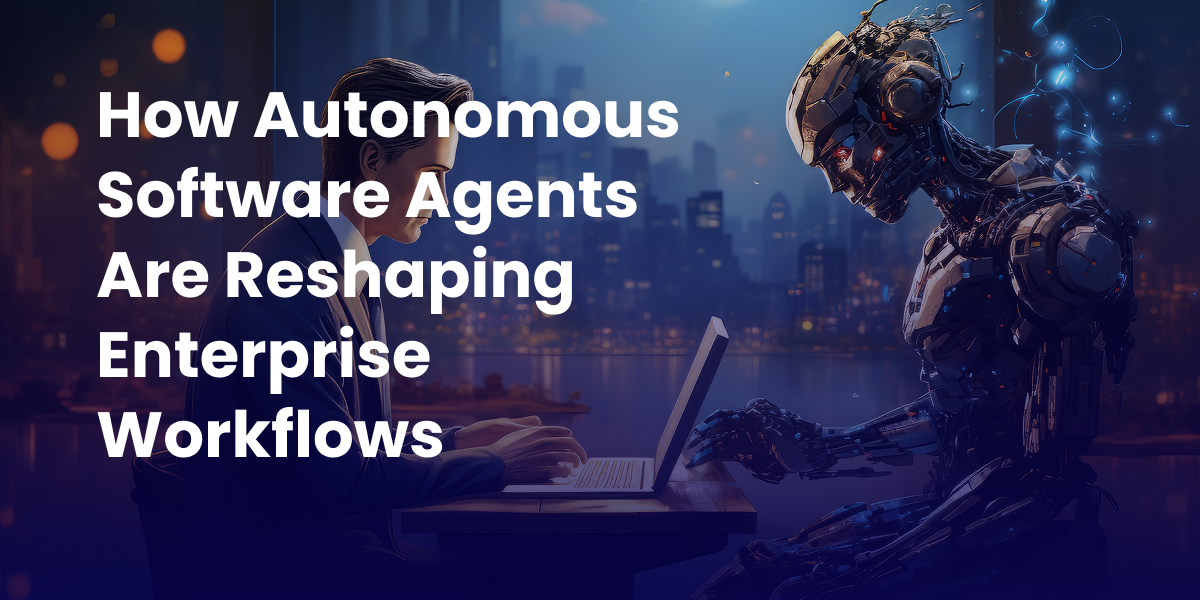In the fast-evolving world of enterprise technology, automation is no longer a luxury it’s a necessity. While traditional automation has helped businesses streamline repetitive tasks, the emergence of autonomous software agents is ushering in a new era of productivity, intelligence, and scalability. These agents are not just tools they’re active participants in your business workflows.
In this blog, we’ll explore what autonomous software agents are, how they work, and why they are reshaping enterprise operations across industries.
What Are Autonomous Software Agents?
Autonomous software agents are intelligent programs that can make decisions, take actions, and adapt to changing environments all without constant human intervention. Unlike traditional bots that follow fixed rules, these agents use artificial intelligence (AI), machine learning (ML), and natural language processing (NLP) to understand goals, plan actions, and execute tasks autonomously.
How Do They Work?
Autonomous agents typically follow a 4-step process:
-
Perceive – Gather information from the environment (e.g., CRM, email, APIs).
-
Plan – Determine what actions need to be taken based on goals and context.
-
Act – Execute the required actions (e.g., send emails, update databases, create tickets).
-
Learn – Monitor outcomes, adjust behavior, and improve performance over time.
Popular frameworks for building such agents include OpenAI agents, LangChain, Auto-GPT, and other enterprise-grade AI platforms.
Where Are They Being Used in Enterprises?
Autonomous agents are being deployed in several business areas. Here are some common use cases:
1. Customer Support
AI agents can handle tickets, answer FAQs, escalate complex issues, and update customers in real-time—reducing support load and improving response times.
2. Sales & Marketing
Agents follow up with leads, schedule meetings, and personalize campaigns using CRM and behavioral data.
3. Human Resources
From screening resumes to onboarding employees and answering HR queries, agents are streamlining the entire hiring and people management process.
4. Finance & Operations
Tasks like invoice generation, expense tracking, and forecasting can be handled with minimal human input by intelligent agents.
How Are They Reshaping Workflows?
Traditional enterprise workflows rely heavily on human involvement, handovers, and approvals. Autonomous agents reduce this friction by acting independently, resulting in faster and smarter execution.
Example:
| Traditional Workflow | With Autonomous Agent |
|---|---|
| Manual ticket logging | Agent detects issue and logs it |
| Human-driven follow-ups | Agent sends personalized follow-ups |
| Scheduled report generation | Agent builds and sends daily reports |
| Long response times | Agent replies instantly with context |
Benefits of Autonomous Software Agents
Increased Efficiency – Agents work 24/7 without breaks, handling thousands of tasks simultaneously.
Scalability – Easily scale operations without adding more human resources.
Cost Savings – Reduce dependency on large teams handling repetitive tasks.
Better Decision-Making – Agents use real-time data to make informed, timely decisions.
Challenges to Consider
Security and Trust – Agents must operate within safe boundaries to avoid unintended actions.
Integration Complexity – They need to be well-integrated with existing systems and data.
Oversight – Human supervision is still important for edge cases and sensitive operations.
The Future of Autonomous Agents
We're moving toward a future where digital employees (AI agents) handle most of the repetitive and operational tasks in enterprise settings. This allows human employees to focus on strategic thinking, creativity, and innovation. As the technology matures, businesses will not just use software they will collaborate with intelligent agents that learn, act, and grow with the organization.
Final Thoughts
The rise of autonomous software agents is transforming how enterprises function. Whether you're managing internal workflows, engaging customers, or scaling operations these AI-driven agents offer speed, accuracy, and efficiency at a level never seen before. If you're a business looking to stay competitive and agile in the age of AI, now is the time to explore how agentic AI can be integrated into your enterprise software strategy.

